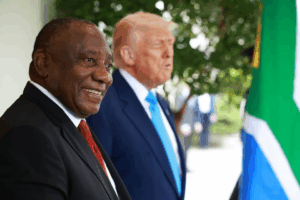
Given our lack of a shared national vision, the immaturity of many of our politicians and the normalisation of dishonesty, insult and general crudity in our public sphere, it is possible we will turn towards more independent forms of organisation.
Brace yourself, South Africa. The next five years in local government will be a rough ride. The horse-trading in the hung councils might bring some temporary relief but none of these coalitions is a match made in heaven. The minion parties now have an inflated sense of their power and they will want to exercise it to the full. Many will also want to get their faces into the pie and will try to use their new power to access tenders.
In many parts of the world coalition governments are systematically unstable. Witness Italy, which since World War 2 has been a revolving door of shaky governments. India, the world’s most populous democracy, also has an unhappy record with coalitions. Coalitions can be well managed, as we see in Germany and the Netherlands, but that takes a strong sense of a shared commitment to putting the national interest before petty party politicking. This is not easily achieved in societies with stark political divisions and a lack of even a basic shared vision.
The tragedy in South Africa is that the ANC, which had the sort of widespread support in and out of elected office to drive a real programme of change, has squandered the people’s trust through systemic corruption and poor service delivery. History shows that when national liberation movements start to lose popular support the decline is irreversible, and becomes increasingly rapid.
We are unlikely to return to a situation in which one party can win decisive victories for many years, perhaps at least a generation. For the foreseeable future, elections will result in coalitions, initially in local government and then in national government. Given our lack of a shared national vision, the immaturity of many of our politicians and the normalisation of dishonesty, insult and general crudity in our public sphere, one possible outcome of all this is a turn away from hope in the state and towards more independent forms of organisation.
And the hung councils are just a passing show. Government is fast becoming irrelevant to many people as the poor start to abandon hope of ever receiving services or housing, let alone jobs. Middle-class communities go off-grid, turning their noses up at Eskom and an unstable water supply. The new coalitions might find themselves with little to steal as the tax coffers dry up.
But the turn away from trust in the state can take many forms. In some cases, it can be progressive, as with the hugely impressive eKhenana Commune in Cato Manor in Durban, where residents have built their own homes, school, agricultural project, community hall and more. In other cases, it can take the form of the middle classes simply withdrawing from the rest of society via private schools, security, healthcare as well as private access to water and electricity. There are also incredibly dangerous forms of organisation that can emerge from a collapse of confidence in the state. As we saw during the July riots, armed groups were formed to take over policing in the absence of the state, with, in some cases, horrific consequences.
But this is not the whole story. During the riots there were also all kinds of projects to build solidarity, such as bringing in and distributing food. As confidence in the state collapses it will become increasingly necessary for us to disentangle the exclusionary and dangerous elements of the turn towards self-reliance from the positive possibilities rooted in building solidarity.
South Africans are battered by corruption, an increasingly failed state and a shrill, crude and often dishonest and threatening political culture. We are exhausted. But this is not the time to give up. This is the time to dig deep and build a politics of decency, honesty and solidarity from within society. Waiting for the politicians to save us is no longer credible. It’s up to us from here on. DM168
This column first appeared in our weekly Daily Maverick 168 newspaper.
Dr Imraan Buccus is senior research associate at the Auwal Socio-Economic Research Institute and a postdoctoral scholar in gender justice, health and human development at Durban University of Technology.






